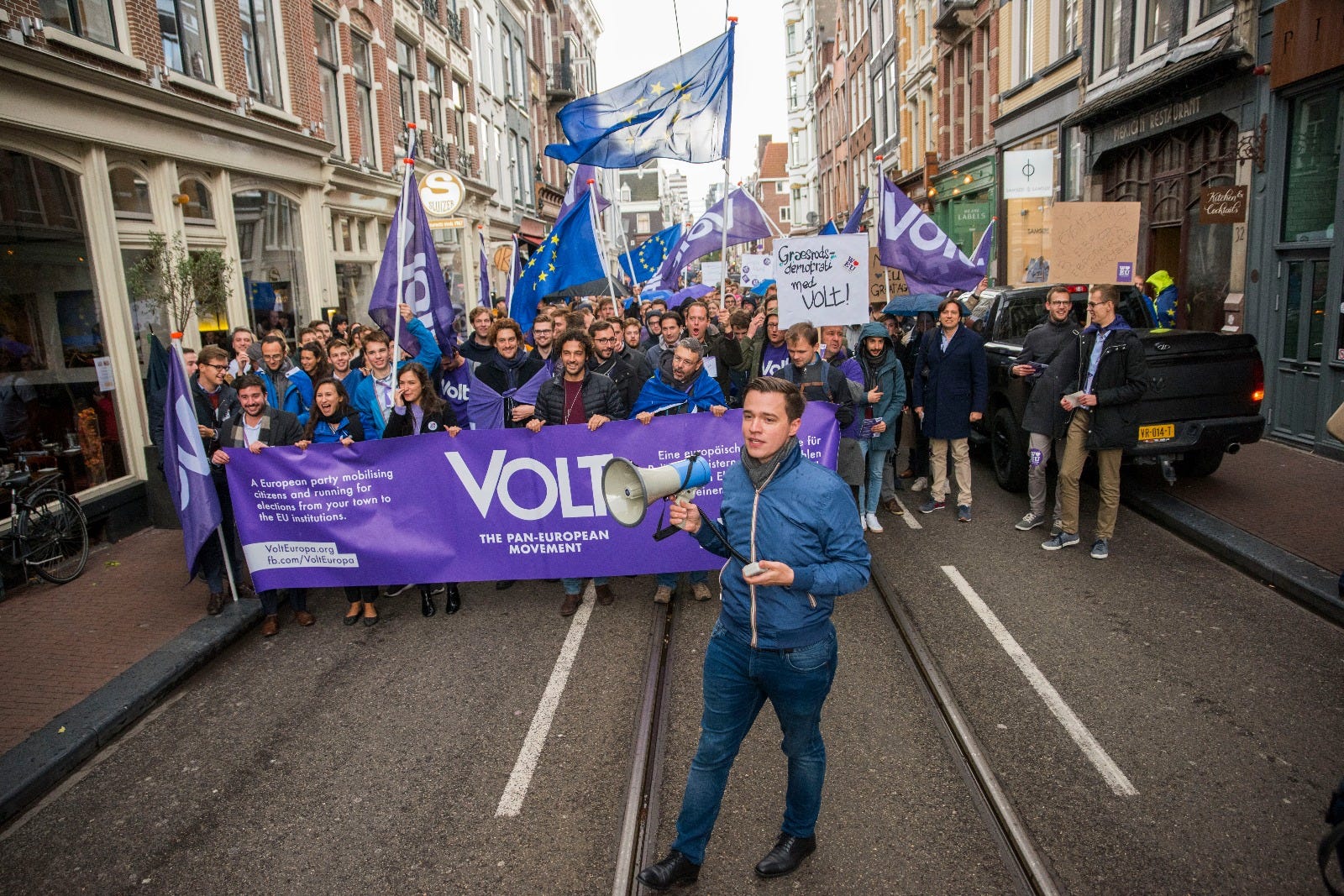This article is co-written by Andrea Venzon, Colombe Cahen-Salvador and Damian Boeselager, and was originally published in Euractiv, on May 3, 2019. Click here to read the original piece.
The logistical barrier facing new pan-European political parties need to be addressed if the EU’s political union is to become reality, argue three founders of Volt, a new pro-European political movement.

The first question we often get asked when presenting Volt — the progressive pan-European party we founded — is: how do you find common political ground among people from so many different countries?
The most difficult step in European politics is not in finding common ground: this is easier than you might think. Most Europeans face similar problems and have similar hopes, and common solutions exist.
The most difficult step in doing European politics is the system itself. Not only do real European parties not exist, but when trying to create one, multiple barriers to democracy arise across the continent.
The EU is supposedly a political union, which means that there should be a real and united political sphere. Yet this is not the case. Right now, the European Parliament is comprised of groups, that are basically conglomerates of national political parties with different national interests that run campaigns at home, often on national issues, and then come to work together on policy-making in the European Parliament.
This means that when voting for a national party during European elections, citizens actually vote for a group that might have different policies. For example, when voting for the CDU (a centre-right wing party in Germany), voters actually vote for a group with hard right parties like Orban’s Fidesz (the EPP).
Complicated, right?
Unfortunately, this isn’t the end of it. Multiple barriers to democracy arise when running for the European elections. In addition to not being able to have real political parties, countries set radically different voting rules and put in place systems that sometimes render the accessibility of the political arena almost impossible in some countries.
Some even make it impossible to register a party or force you to print your own ballot. Other countries are democratic enough to be used as best practices.
Let’s take three case studies: 1) Italy, the country where the mountain is so high you can’t climb it, 2) France, where money gives you the right to run, and 3) Germany, the light at the end of the tunnel. Those are the three countries where Volt started.
In Italy, 150,000 signatures need to be collected by hand, and each signature needs to be verified by a notary or similar agent while papers are being signed, to be allowed to participate in the European elections.
But that’s not all, this monumental number of signatures cannot be collected in a few big cities and regions where a party might have its stronghold: each region has to provide at least 3,000 signatures.
This number is not proportional to its population: tiny Valle d’Aosta and Lombardy have the same target, despite counting 128,000 and 10 million inhabitants respectively.
Across the Alps, France presents many obstacles that might not be visible to the eyes of a newcomer. To pick one example, the French system requires political parties to print their own ballots to be able to participate in the elections.
In France, single ballots are not used, which has huge environmental and financial costs. As a result, if a party or a civic list wants to participate in elections, they need to overcome many hurdles, including raising close to €1 million simply to print pieces of papers to enable citizens to vote. Distributing ballots should be the task of the state, not the party.
Finally, the German system is highly democratic. The main requirements being that the party is approved as a functioning democratic party, and that 4,000 signatures are collected and verified by a public office.
In addition, the threshold was judged unconstitutional in 2014 as against the principles of electoral equality and equal opportunities.
France, Italy and Germany. Those are three countries that can often seem close in terms of democracy. Yet, their systems and barriers to entry vary widely. Once those barriers are overcome, one last hurdle remains: thresholds.
Each country sets its own electoral threshold. While in Germany there is no threshold, an Italian party will have to reach 4% at the ballots, and a French one 5%. This means that in France, citizens either elect four members of parliament, or 0.
It is high time to enable the creation of real EU parties to fulfil the EU’s goal of being political. Current EU parties are loose coalitions of national parties, often with conflicting interests; a real EU democracy needs strong European parties defending their vision of the future of Europe.
Regulation 1141/2014 of the European Parliament and Council needs to be amended to create a new legal status for European political parties.
Additionally, the same voting rules have to be implemented for the European Parliament elections across the EU so that a best-practice like Germany may be followed, and that we all abide by the same regime for the same elections.
A proposal for uniform voting rules across the EU needs to be submitted for adoption by the Parliament, and Council.
In a Union that claims to be democratic and political, such difficulties are unacceptable. The strength of democracy is found in its plurality. Citizens’ voices need to be heard, politicians need to have the right to run, and the people’s political will needs to be respected.